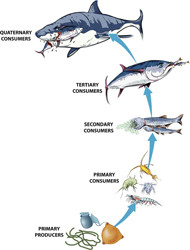Understanding ocean food web dynamics
Plankton are marine-dwelling microscopic plants (phytoplankton) and animals (zooplankton) that form an essential part of pelagic food webs. At the bottom of the food chain, phytoplankton are primary producers that convert sunlight into carbohydrates. Since zooplankton eat phytoplankton and themselves are eaten by higher organisms like fish, they play a critical role in linking food webs. The EU-funded 'Isotopes of zooplankton to measure climate and human impacts on pelagic food webs' (ISOZOO) project analysed environmental conditions affecting phyto-zooplankton food web structures. To simulate the effect of future nutrient-deficient oceans, researchers sampled and characterised food web structures in oceans spanning nutrient-rich to nutrient-poor environments. Using data from the Mediterranean Sea and South Pacific, North Pacific and South Atlantic Oceans, researchers confirmed that food chains were longer in nutrient-poor than in nutrient-rich regions. Since energy is lost with each step in the food chain, food-chain length has a profound effect on top-end predators. Nutrient-rich conditions supporting large, highly productive phytoplankton species require fewer trophic levels and result in increased animal and fish biomass. Conversely, in nutrient-poor regions low primary productivity from smaller phytoplankton leads to increased food-chain length, energy loss at each step and decreased top-level predator biomass. ISOZOO will use established zooplankton-phytoplankton nutrient relationships to develop a zooplankton food web index to monitor climate-induced changes in ocean conditions. Ultimately, they hope their data will be incorporated into ecosystem models to enhance ocean food web management amid predicted changes in oceanic nutrient conditions.







